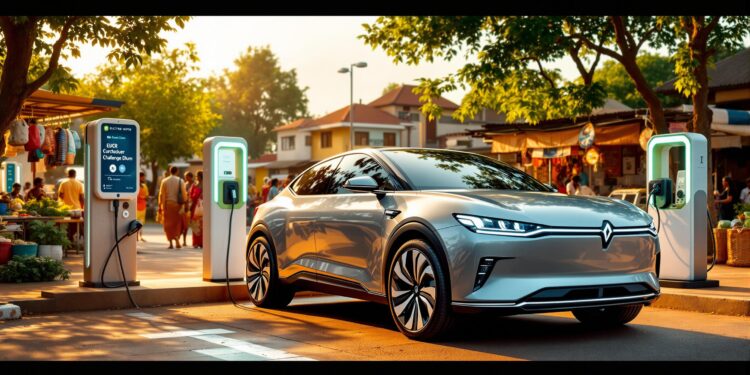- High Costs: Import taxes and limited affordable models make EVs expensive for most Tanzanians.
- Infrastructure Gaps: Few public charging stations, especially in rural areas, and an unreliable power grid.
- Policy Issues: No clear EV policy yet, leading to registration delays and limited investor confidence.
- Public Awareness: Many are unaware of EV benefits, and myths about performance persist.
Key Solutions in Progress:
- Charging Networks: WAGA Motion is expanding EV charging infrastructure.
- Tax Incentives: Government plans to reduce import duties and support local assembly.
- Policy Development: A national EV policy is expected to streamline regulations by 2024.
- Awareness Campaigns: Media efforts aim to educate the public on EV advantages.
Tackling these barriers requires collaboration between the government, private sector, and media to create a sustainable EV ecosystem.
EV Adoption in Tanzania: Current State
Market Overview and Growth Potential
Tanzania leads East Africa in the adoption of electric vehicles, with over 5,000 EVs currently in use – more than the rest of the region combined [3]. The two- and three-wheeler segment has been a standout, showing considerable growth over the past ten years.
Private sector efforts and entrepreneurial ventures have been the backbone of this progress. For example, Piki, a food delivery service, has shown that electric mopeds can work well commercially. They’ve also created jobs, employing women and students as drivers [2]. From a tax perspective, e-scooters enjoy a 0% excise duty and a 10% import duty, while e-motorcycles face higher rates: 10% excise duty and 25% import duty.
Key Players and Initiatives
The e-mobility ecosystem in Tanzania includes companies like Greenfoot Africa, which has attracted international grants, and TRI, a manufacturer of affordable electric three-wheelers. However, funding remains a challenge. Tanzanian e-mobility companies have raised just over US$1 million as of March 2023, a stark contrast to Uganda’s US$5 million and Kenya’s US$50 million [2].
TRI’s E2 electric three-wheeler offers a 100km range and charges in just 2.5 hours, selling for US$3,500 – a competitive option in the market.
Tom Courtright, Research Director of AfEMA, emphasizes the financial advantages of electric power:
"Electricity is undeniably cost-effective in the long run for consumers."
Still, challenges like limited infrastructure, affordability issues, and gaps in policy continue to slow broader EV adoption in Tanzania.
Infrastructure Challenges
Limited Charging Infrastructure
Tanzania may have the largest number of EVs in East Africa, but the country still struggles with a lack of public charging stations. This shortage makes it tough for people to consider switching to EVs, especially for long-distance travel. Most charging stations are located in cities, leaving rural areas without access.
To tackle this issue, WAGA Motion has launched a pilot project to install charging stations for specific EV users, with plans to eventually open these stations to the public.
Unreliable Power Supply
Another hurdle for EV adoption in Tanzania is the unstable electricity grid. The increasing use of gas-powered generation has made power outages more frequent. These interruptions affect daily charging, fleet operations, and even emergency needs, making EV users anxious about running out of charge.
Solutions for Infrastructure Gaps
The National Policy Working Group (PWG) is working on a framework to support the growth of e-mobility in Tanzania [2]. Efforts include partnerships between public and private sectors, using renewable energy, and carefully planning where to place charging stations. Solar-powered charging hubs and stations at existing fuel stops are among the practical solutions being developed.
By 2023, at least 10 companies are contributing to Tanzania’s EV market, handling everything from importing and selling vehicles to servicing and charging them [3]. Although the market is still small, these efforts are setting the stage for broader EV adoption.
While progress is being made to address infrastructure challenges, the high cost of EVs remains a major obstacle for many Tanzanians. This issue needs further attention from policymakers and stakeholders.
Drivers of electric vehicles face charging deserts as stations remain concentrated near cities
sbb-itb-d9186c2
Economic Barriers: High Costs of EVs
Economic challenges, combined with gaps in infrastructure and policy, continue to slow the adoption of electric vehicles (EVs) in Tanzania.
High Import Taxes and Duties
One of the biggest hurdles for Tanzania’s EV market is the high import taxes and duties. These significantly drive up the cost of EVs, making them less affordable for consumers. With limited investment in the e-mobility sector, dealers face difficulty keeping prices competitive while maintaining profitability. This added expense is ultimately passed on to buyers, leaving them to pay a premium for imported EVs.
Limited Affordable Models
Affordable EV options are scarce in Tanzania. Most of the available models are imported from wealthier markets, and their prices are inflated due to import-related costs. The absence of local manufacturing or assembly facilities further exacerbates the issue. Local production could help lower prices, but without it, EVs remain out of reach for many middle-income consumers. The lack of entry-level models is a major deterrent for those considering the switch to electric vehicles.
Financial Incentives
Financial solutions could play a key role in making EVs more accessible. Options like low-interest loans, tax reductions, subsidies, and support for local assembly could collectively bring down costs and encourage adoption.
| Incentive Type | Potential Impact |
|---|---|
| Import Tax Reductions | Makes EVs more affordable upfront |
| Government Subsidies | Lowers purchase prices for consumers |
| Local Assembly Support | Cuts production costs and creates jobs |
| Green Financing | Provides loans with better terms |
The Africa E-Mobility Alliance highlights that tackling these financial challenges is essential for growing the EV market [3]. While financial incentives are a step forward, resolving policy and regulatory issues is just as important to drive EV adoption in Tanzania.
Policy and Regulatory Gaps
Tanzania’s lack of a defined electric vehicle (EV) policy creates challenges for stakeholders, slowing down both adoption and investment.
Lack of EV Policies
LATRA plans to introduce an EV policy by mid-2024. While current tax exemptions – ranging from 0% to 44% excise duty for electric four-wheelers and buses – are a positive step, they fall short of driving significant market growth. Compared to fifteen other African nations with established e-mobility policies, Tanzania’s framework still misses key elements needed to support EV development.
| Policy Area | Current Status | Impact on EV Adoption |
|---|---|---|
| Tax Structure | Partial exemptions for E4W and e-buses | Limited market stimulation |
| Registration Process | No standardized procedures | Administrative barriers |
| Supportive Regulations | Absent | Reduced investor confidence |
Registration and Licensing Issues
Unclear EV registration processes lead to higher costs and delays, discouraging buyers and businesses alike. This lack of clarity creates uncertainty for both individual consumers and fleet operators, stalling market expansion.
Policy Development Recommendations
Sisty Basil, Executive Director of Energy and Livelihoods for Communities (E-LICO), highlights the urgency of formalizing EV policies:
"Tanzania still does not have a policy governing electric vehicles, so these presentations will go into the recommendations for Tanzania’s electric vehicle policy, then to Parliament, and later become law" [1].
Key recommendations include revising tax policies, introducing EV mechanic training programs, setting up guidelines for charging stations, and simplifying the registration process.
The Africa E-Mobility Alliance underscores the importance of regulatory consistency:
"Without stability in regulations and tax rates, it is difficult for e-mobility companies to plan long-term" [2].
A well-structured policy framework is essential to tackle infrastructure and economic challenges. However, addressing public awareness and dispelling misconceptions about EVs is equally important for encouraging adoption.
Public Awareness and Perception
Public understanding and attitudes toward electric vehicles (EVs) in Tanzania present a major challenge to their broader acceptance. A lack of knowledge about EV advantages, combined with ongoing myths, continues to influence consumer choices and slow market growth.
Limited Awareness of EV Advantages
Many people in Tanzania are still unaware of the benefits EVs offer. Key perks like lower operating costs and reduced emissions often go unnoticed. This lack of awareness makes it harder for potential buyers to consider switching from traditional vehicles to electric ones.
Concerns About Range and Performance
Misunderstandings about EV range, charging options, and overall performance remain common. Despite advancements that tackle these issues, many still believe EVs can’t handle daily travel needs or match the performance of conventional cars. In reality, modern EVs are designed to meet everyday requirements, perform competitively, and require less maintenance. Additionally, the growing network of charging stations makes EV ownership increasingly practical.
Awareness Campaigns and Media Efforts
Efforts are underway to bridge this knowledge gap. Platforms like AutoMag.tz are actively working to inform the public about EVs and the progress of e-mobility in Tanzania. These initiatives emphasize benefits such as cost efficiency, reduced environmental impact, and improved technology.
Technology also plays a role in easing concerns. Features like mobile payment systems and real-time charging station locators show how practical challenges can be addressed. Awareness campaigns are increasingly using hands-on demonstrations and relatable examples to dispel myths and build trust.
Improving public awareness is essential for tackling the economic and infrastructure challenges holding back EV adoption in Tanzania. By combining education efforts with policy updates and infrastructure growth, the country is laying the groundwork for a faster shift to electric mobility.
Conclusion: Overcoming EV Adoption Barriers in Tanzania
Tanzania faces several challenges in its shift toward electric vehicles (EVs), but coordinated efforts can pave the way for a thriving EV ecosystem. Partnerships between sectors are key to addressing these obstacles, especially when it comes to infrastructure.
For example, WAGA Motion’s expansion of charging stations highlights how private companies can fill infrastructure gaps. Meanwhile, the government’s push for policy changes, including tax incentives, is set to make EVs more affordable and accessible for Tanzanians.
"We are working towards including incentives in the tax laws to create a supportive environment for EV registration and charging infrastructure" [1]
Here’s a breakdown of how specific challenges are being tackled:
| Challenge | Solution and Impact |
|---|---|
| Infrastructure Gap | WAGA Motion’s charging network pilot boosts accessibility |
| High Costs | Tax incentives lower import duties and fees |
| Policy Uncertainty | National EV policy offers clear regulations |
| Public Awareness | Education campaigns improve understanding of EV benefits |
Tanzania’s progress hinges on collaboration among the government, private companies, and media outlets. Public education, infrastructure projects, and policy updates work together to create a solid foundation for EV adoption. Platforms like AutoMag.tz are instrumental in keeping the public informed and tracking industry advancements. By working together, Tanzania can overcome these hurdles and move toward a cleaner, more sustainable future in mobility.
Related Blog Posts
- 5 Most Fuel-Efficient Cars Available in Tanzania 2025
- Common Car Problems in Tanzania: Solutions Guide
- Car Financing in Tanzania: Pros and Cons
- TBS Inspection Standards for Imported Vehicles




